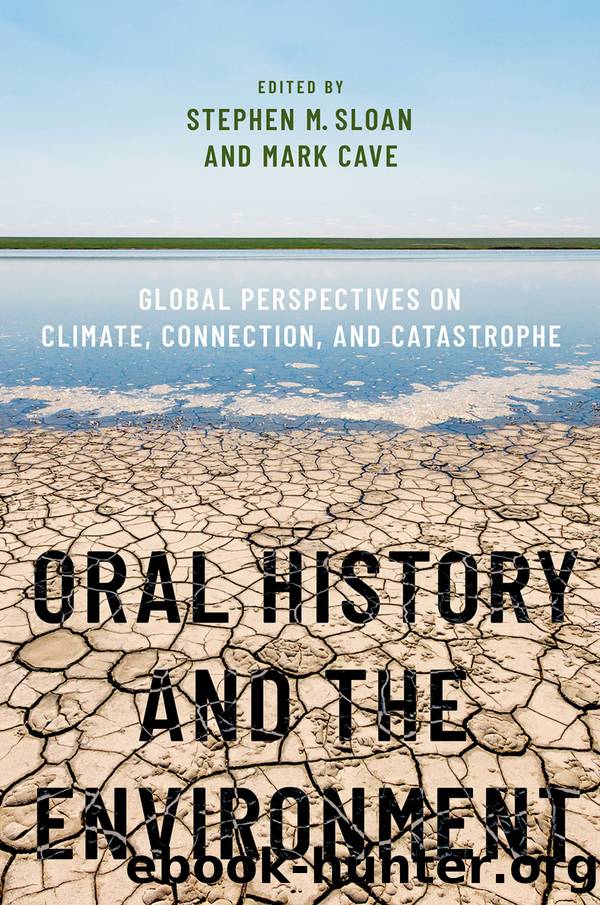Oral History and the Environment by Stephen M. Sloan

Author:Stephen M. Sloan
Language: eng
Format: epub
Publisher: Oxford University Press
Published: 2022-01-15T00:00:00+00:00
Notes
1.EPA, âDrinking Water: EPA Needs to Take Additional Steps to Ensure Small Community Water Systems Designated as Serious Violators Achieve Compliance,â US Environmental Protection Agency, March 22, 2016. https://www.epa.gov/sites/production/files/2016-03/documents/20160322-16-p-0108.pdf.
2.EPA, âEnvironmental Justice 1994 Annual Report: Focusing on Environmental Protection for All,â US Environmental Protection Agency, 1995. https://nepis.epa.gov/Exe/ZyPURL.cgi?Dockey=40000AFB.txt
3.âEnforcement and Compliance History Online,â US Environmental Protection Agency, https://www.epa.gov/laws-regulations/summary-safe-drinking-water-act).
4.Departamento de Salud de Puerto Rico, âReporte de Brotes de Enfermedades Asociadas Al Agua de Puerto Rico 1976â1998,â San Juan, Puerto Rico: Programa Agua Potable, Departamento de Salud de Puerto Rico, 1999.
5.âEPA Adds Corozal Well Site in Corozal, Puerto Rico to the Superfund List,â US Environmental Protection Agency, March 13, 2012. https://archive.epa.gov/epapages/newsroom_archive/newsreleases/7346cebd7aed2918852579c0005f8dcb.html
6.Sara Del Valle Hernández, âSequÃa Afecta Calidad Del Agua Potable Servida En El Ãrea Metropolitana,â El Nuevo Dia, February 9, 2017, http://www.elnuevodia.com/noticias/locales/nota/sequiaafectacalidaddelaguapotableservidaenelareametropolitana-2289454/.
7.My focus on individual memories is in no way a call to undervalue either the importance of scientific measurement or the reach of SDWA in protecting both public and environmental health. The SDWA has been crucial for protecting communities at risk of health impacts: for example, the application of SDWA in the case of the Flint city water system in Michigan in the United States highlights the importance of this law in protecting the health of disenfranchised social groups.
8.In part, this race to disconnect community water systems is rooted in misunderstandings about appropriate measures of tropical water quality which add to the perceived notion of risky water, something I discuss elsewhere. See Javier Arce-Nazario, âThe Science and Politics of Water Quality,â in The Palgrave Handbook of Critical Physical Geography, ed. Rebecca Lave, Christine Biermann, and Stuart N. Lane. (London: Palgrave Macmillan, 2018), 465â83.
9.âPrinciples of Environmental Justice,â 1991, last modified April 6, 1996, http://www.ejnet.org/ej/principles.html.
10.Gerardo Millán-Ramos and Jorge MartÃnez-RamÃrez, âIntegration of Public and Private Resources at the Solution of a Public Health Problem: The PPW Experience in Puerto Rico,â (paper presented at the annual meeting for the Inter-American Association of Sanitary and Environmental Engineering Caribbean Regional Congress, San Juan, Puerto Rico, 1997), 2.
11.Garret Hardin, âThe Tragedy of the Commons,â Science 162 (1968): 1243â48.
12.E. Schlager, and E. López-Gunn, âCollective Systems for Water Management: Is the Tragedy of the Commons a Myth,â in Water Crisis: Myth or Reality, ed. Peter Rogers et al. (London: Taylor & Francis, 2006), 43â58.
13.Karen Bakker, âNeoliberal versus Postneoliberal Water: Geographies of Privatization and Resistance,â Annals of the Association of American Geographers 103 (2013): 253â60.
14.Vandana Shiva, Water Wars: Privatization, Pollution, and Profit. (Berkeley: North Atlantic Books, 2016).
15.Elinor Ostrom, Governing the Commons: The Evolution of Institutions for Collective Action (Cambridge: Cambridge University Press, 1990).
16.Esther Wiesenfeld, âThe Concept of âWeâ: A Community Social Psychology Myth?,â Journal of Community Psychology 24 (1996): 337â46.
17.Estado Libre Asociado de Puerto Rico, âOrden ejecutiva para declarar un estado de emergencia repecto al uso de las aguas por sequÃa y establecer un plan de acción interagencial,â OE-2015-011 § (2015).
18.Autoridad de Acueductos y Alcantarillados, âOrden administrativa para regular el uso de agua potable durante la vigencia del estado de emergencia por sequÃa,â OA-2015-02 § (2015).
19.Keyla López Alicea, âLo Que Dejó La SequÃa Al PaÃs,â El Nuevo Dia, January 14, 2016, http://www.
Download
This site does not store any files on its server. We only index and link to content provided by other sites. Please contact the content providers to delete copyright contents if any and email us, we'll remove relevant links or contents immediately.
Guns, Germs and Steel by Diamond Jared(2366)
Collapse: How Societies Choose to Fail or Succeed by Jared Diamond(1516)
The Emperor of All Maladies by Siddhartha Mukherjee(1438)
Transcendence by Gaia Vince(1139)
148424513X by Unknown(1077)
Seven Skeletons by Lydia Pyne(1068)
Civilization One by Christopher Knight(1004)
Sapiens - A brief history of humankind (Marathi) by Yuval Noah Harari(996)
The Rational Optimist: How Prosperity Evolves by Matt Ridley(965)
THE MASTER AND HIS EMISSARY by Iain McGilchrist(944)
Guns, Germs, and Steel: The Fates of Human Societies by Jared M. Diamond(938)
At Home by Bill Bryson(909)
Underworld The Mysterious Origins of Civilization by Graham Hancock(899)
How the Irish Saved Civilization by Thomas Cahill(895)
Marco Polo by Laurence Bergreen(893)
Atrocitology by Matthew White(880)
Ancient Iraq by Georges Roux(863)
The World Until Yesterday: What Can We Learn From Traditional Societies? by Jared Diamond(855)
Guns, Germs and Steel: The Fates of Human Societies by Jared Diamond(853)
